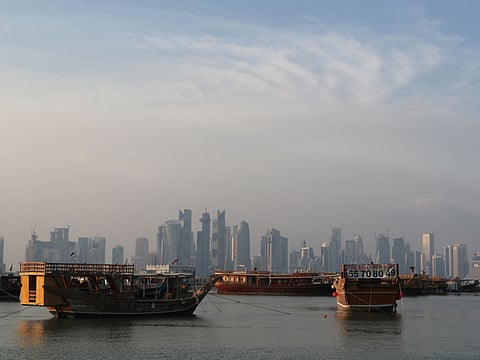Real opposition to Qatar is from within the country
Emergence of Shaikh Sultan will keep the authorities in Doha on their toes and with the backing of the Al Merri tribe, a change may be forced upon the ruling faction

This week, popular French magazine Le Point published a remarkable story about French businessman Jean-Pierre Maronigiu, who recently spent jail time in Qatar over dud cheques. While in prison, he came across 20 members of the Qatari royal family, all jailed since early June for criticising the present emir, Shaikh Tamim Bin Hamad Al Thani. Confirming the incident, prominent Kuwaiti journalist Fouad Hashem told Gulf News: “The real opposition in Qatar is not abroad but within Doha, spread across the military apparatus and royal family. This is where real dissent is rooted.”
At a high-profile function in London last month, hundreds of Qatari dissidents gathered at the Qatari Global Security and Stability Conference, repeating similar stories of abuse. The conference agenda included three broad topics: 1) Ending Qatar’s support for terrorists and non-state actors (like members of Hamas and Muslim Brotherhood); 2) Human rights abuses in Qatar; 3) Need for democratisation of the Qatari regime; 4) Modifying news coverage and editorial policies of the Doha-based Al Jazeera TV channel. Organiser of the conference and veteran opposition leader Khalid Al Hail estimates the number of anti-Tamim figures in exile at 32,000, expecting the number to rise in the upcoming weeks, as Doha cracks down on internal critics.
This week, Qatari authorities revoked the nationality of 42-year old poet Mohammad Bin Futais Al Merri, winner of the 2007 UAE-based Poet of the Million Award. Back then, Doha had celebrated him heartily, especially after he donated the prize money to children with special needs in Qatar and Palestine. He is now being subjected to character slaughter to punish his defence of Saudi Arabia. Al Merri was recently quoted as saying: “Insulting King Salman [of Saudi Arabia] is a line of fire just like insulting the homeland,” adding: “While I have allegiance to my country, I am for Gulf unity.” Passports are usually revoked when citizens of a country commit treason, like spying or transferring sensitive information to enemy territory — two crimes that Al Merri certainly was not guilty of.
Prominent elders of the Al Merri tribe — whose members bestride Saudi Arabia and Qatar — objected to the maltreatment of their iconic son. Doha responded swiftly, revoking the nationality of 54 members, 18 of whom are women, including prominent tribe chief Shaikh Talib Bin Mohammad Bin Shraim. A furious Shaikh Talib snapped: “Qatar has become a safe haven for terrorists.”
These draconian measures prompted a senior member of the Al Thani family, Shaikh Sultan Bin Suhaim, to speak up from Paris, accusing Shaikh Tamim, via Twitter, of becoming the “Stalin of this age”.
Last Friday, Shaikh Sultan travelled to Saudi Arabia to attend a tribal conference in support of the Al Merri tribe. Addressing the crowd, he said: “I came from France to support the tribes, owners of these lands, who are being replaced with mercenaries. We will forcefully restore the nationality of Bin Shraim.” As he concluded Mohammad Bin Futais rose to the podium, delivering a passionate recital that slammed Shaikh Tamim.
Unlike Abdullah Bin Ali, the previously unknown emir who emerged last August to mediate Qatari-Saudi relations before the Haj, Shaikh Sultan is a heavyweight in the Al Thani family. Born in 1984, he is the eighth son of Qatar’s founding foreign minister who now heads a powerful holding company and NGO bearing his name, which caters to educational needs and community service in Doha. Although unlike Abdullah Bin Ali, neither his father nor his brother were emirs of Qatar, he himself is a prominent name in Qatari society, well-liked and respected within the royal family and among Qatari youth. Over the weekend, he said: “Our brothers in the Gulf and the Arab world have ostracised us because of fatal errors that were committed against them alongside ugly practices ... these actions were committed in our name, from our land, and with our tools,” adding that such malpractices by Doha need to stop immediately.
The emergence of Shaikh Sultan will certainly keep the authorities in Doha awake all night. Working with Khalid Al Hail and Abdullah Bin Ali — with the full backing of the entire Al Merri tribe — they now have a chance to force a change in its behaviour. If anything, the Qatari opposition movement is snowballing and there are no indicators from Doha that Shaikh Tamim is backing down — certainly not with the arrest of family members and the revoking of nationality of prominent Qatari intellectuals, whose only crime was — not criticising Tamim, but praising King Salman of Saudi Arabia. A popular British idiom goes something like tis: “Giving one enough rope to hang himself.” And strangely, this is exactly what Shaikh Tamim Bin Hamad is doing to himself.
Sami Moubayed is a Syrian historian and former Carnegie scholar. He is also author of Under the Black Flag: At the frontier of the New Jihad.


